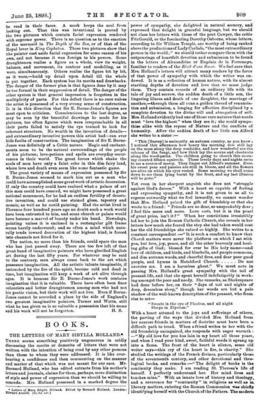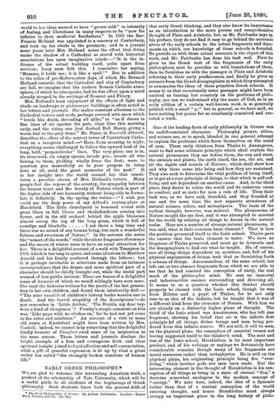BOOKS.
THE LETTERS OF MARY SIBYLLA HOLLAND.. THERE seems something positively ungenerous in coldly discussing the merits or demerits of letters that were not written with the intention of being read by any other persons than those to whom they were addressed. It is like over- hearing a confidence and then commenting on the manner and matter of that which was not meant for our ears. Mr. Bernard Holland, who has edited extracts from his mother's letters and journals, claims for them, perhaps, more distinction of style and power of expression than we should be willing to concede. Mrs. Holland possessed in a marked degree the
• Letters of Mary Sibylla Holland. Edited by Bernard Holland. London : Edward Arnold. [7a. 61. Let.]
power of sympathy, she delighted in natural scenery, and expressed that delight in graceful language, but we should not class her letters with those of the poet Cowper, the critic FitzGerald, or the fascinating Dorothy Osborne, whose letters, according to Sir William Temple, are worthy of being ranked above the productions of Lady Carlisle, "the most extraordinary person in the world ; " we should rather compare them with the outpourings of heartfelt devotion and submission to be found in the letters of Alexandrine or Eugenie de la Ferronays, familiar to readers of the R6cit d'une Sceur. We feel sure that Mrs. Holland's letters will attract many readers by the force of that power of sympathy with which the writer was en- dowed. It is as a reflection of human nature, with its almost startling depths of devotion and love that we must judge them. They contain records of an ordinary life with its tale of joy and sorrow, the sudden death of a little son, the lingering illness and death of one daughter, the marriage of another,—through them all runs a golden thread of renuncia, tion and submission, a longing for affection disciplined by a. complete devotion to the divine will and abnegation of self. Mrs. Holland evidently had one of those rare natures that needs
must "love the highest" when they see it ; she could sympa-
thise alike with the repose of Nature and the conflicts of humanity. After the sudden death of her little son Alfred she writes to a sister :—
" This [Surrey] is eminently an autumn country, as you know ; I noticed this afternoon how heavy the morning dew still lay on the moss along the deep roadsides, and how wonderful are the colours of the fungi, and how thick lay the acorns and chestnuts along the wood-paths. The children going to church this morn- ing counted fifteen squirrels. These lovely days and nights seem to me a source of mercy. They linger out Alfred's summer. Even his sweet peas and pansies are still in bloom, and all the flowers are alive on which his eyes rested. Some morning we shall come down to see them lying burnt by the frost, and my last illusion will be gone."
Yet even in her sharpest anguish she does not "struggle
against God's decree." With a heart so capable of feeling and expressing sympathy, and it is not given to us all to express outwardly what we feel inwardly, we cannot wonder that Mrs. Holland prized the gift of friendship or that she wrote to a friend : " Friends are so dear, so unspeakably dear ; I feel this more and more. Love costs, but it is the pear/ of great price, isn't it F" When her convictions irresistibly led her to join the Roman Catholic Church, she reveals in her letters bow much she feared the step she had taken would cost her the old friendships she valued so highly. She writes to a constant correspondent :—" It is such a comfort to know that Church matters were never the platform on which I sat with you, but love, joy, peace, and all the other heavenly and heal- ing gifts of God ; blessed for ever be His holy name—and love of children, and birds, and bluebells, and purple commons, and dim autumn woods, and cheerful fires, and dear poor good people, and hymns in Hatchford Church Do not exorcise me. I am a harmless ghost." We must note in passing Mrs. Holland's great sympathy with the toil of peasant life, and that she spent herself indefatigably in work- ing amongst the poor and needy. She remarks, as Shakespeare had done before her, on their " days of toil and nights of deep, dreamless sleep," though her words are but a pale shadow of the well-known description of the peasant, who from rise to set-
" Sweats in the eye of Phcebus, and all night Sleeps in Elysium."
With a heart attuned to the joys and sufferings of others. the parting of the ways that divided Mrs. Holland from
her nearest friends in matters of doctrine must have been a difficult path to tread. When a friend writes to her with the old friendship unimpaired, she responds with eager warmth : —" My old love for you has lain in my heart all these years, and when I read your kind, sweet, faithful words it sprang up into a flame. The frost of the heart is silence, some old writer says—this cry of the heart is fire, is charity." She studied the writings of the French divines, particularly those of the seventeenth century, and other devotional and theo- logical books, and remarks :—" The delight of books is the continuity they make. I am reading St. Theresa'. life of herself. I perfectly understand her. Her mind lives and touches mine." With an innate love of history and theology,, and a reverence for "continuity" in religious as well as in. literary matters, entering the Roman Communion was chiefly identifying herself with the Church of the Fathers. The modern
world to her ideas seemed to have "grown cold" in intensity of feeling, and Christians in many respects to be "now far inferior to their medimval forefathers." In 1882 the Rev. Francis Holland was appointed to a canonry at Canterbury, and took np his abode in the precincts; and in a journal some years later Mrs. Holland notes the effect that living under the shadow of a Cathedral so stored with historical associations has upon imaginative minds :—"It is the in- fluence of the actual building itself, quite apart from services; Lucy soon felt this. I remember her saying, `Mamma, it holds me ; it is like a spell.' " But in addition to the relics of pre-Reformation days, of which Mr. Bernard Holland remarks that the Cathedral and city of Canterbury are full, we imagine that the modern Roman Catholic atmo- sphere, of which he also speaks, had its due effect upon a mind already steeped in the writings of Bossuet and Fleury.
Mrs. Holland's keen enjoyment of the effects of light and shade on landscape or picturesque buildings is often noted in her letters and journals. She makes constant allusions to the Cathedral towers and roofs, perhaps covered with snow which "levels like death, shrouding all alike," or "as if drawn in fine lines of air against the pale, clear blue this morning early, and the rising sun just flushed Bell Harry, giving a warm tint to the grey stone." Mr. Pater, in Emerald Athwart, describes the effect of the central tower of Canterbury Cathe- dral on a receptive mind :—" Here, from morning to night, everything seems challenged to follow the upward lead of its long, bold, perpendicular' lines. The very place one is in, its stonework, its empty spaces, invade you ; invade all who belong to them, yielding wholly from the first; seem to question you masterfully as to your purpose in being here at all, amid the great memories of the past." It is her insight into the world around her that consti- tutes a peculiar charm of Mrs. Holland's letters. Many people feel the repose of the country, the sympathy between the human heart and the beauty of Nature which is part of the higher side of our humanity, without being able to formu- late it definitely. In the spring she writes :—" I wish you could see the deep peace of my Alfred's resting-place at Hatchford. The little churchyard is bosomed round with great lilacs in full bloom and rhododendrons coining into flower, and in the old orchard behind the apple blossoms almost sweep the top of the long grass, which is full of cowslips and bluebells I sat there a long time and there was no sound of any human being, but such a wonderful ulness and sweetness of Nature." In the autumn she notes the "sunset of the woods," while the silent fragrance of summer and the snows of winter seem to have an equal attraction for her. There is a delightful account of a walk with Tennyson in 1891, which is too long to quote, and some allusions to Matthew Arnold and his family scattered through the letters ; but it is perhaps inevitable in selections made from an intimate correspondence that the deeper and more spiritual part of a character should be chiefly brought out, while the social part seemed of less public interest. There are traces of a delightful sense of humour of which we would willingly have seen more. She read the histories written for the youth of the last genera- tion to her own children, and found them intolerably dull The utter banalite of children's history books wearies one to death. And the horrid stupidity of the descriptions !—do you remember in 'Little Arthur,' The Druids, my dear boy, were a kind of clergymen' ? Franky's simple comment on this was, Like papa with no clothes on,' for he had not yet come to the robes and mistletoe." An account of a visit to some old aunts at Knutsford might have been written by Mrs. Gaskell; indeed, we cannot help suspecting that the delightful kindly humour of Craxford owed some of its inspiration to the same source. These letters and journals disclose the bright example of a firm and courageous faith and clear spiritual insight joined to loyal affection and self-renunciation, while a gift of graceful expression is lit up by what a great writer has called "the strangely broken sunshine of human life."



















































 Previous page
Previous page